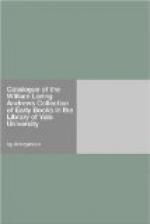Folio. Quires [1-2^{10}, 3^4], 24 leaves, 33 lines to the page, gothic letter, without signatures, catchwords or pagination, place, printer’s name or date. Two- to four-line spaces left for capitals, which are supplied in red. Initial-strokes in red. Hain 11490. Brit. Mus. 15th cent., II, p. 320 (IB. 5531).
Bound with No. 5. Gregorii Homiliae.
8. HUGO de SANCTO VICTORE. Soliloquium de
arrha animae. [Augsburg,
Guenther Zainer.] 12 October,
1473.
Fol. 1^a: Incipit soliloquium beatissimi Augustini episcopi yponensi (sic) de arra anime. Fol. 7^b, END: Rapt_us_ est finis hui_us_ tractat_us_ August_in_i de arra ani_m_e. feria t_er_cia post festu_m_ s_an_cti Dyonisy Anno d_omi_ni lxxiij etc. Fol. 8, blank.
Folio. 8 leaves, the last blank, 33 lines to the page, gothic letter, without place or printer’s name. Three-line space for first initial and initial-strokes supplied in red. Blank last leaf wanting. Hain 2021. Pellechet 1525. Brit. Mus. 15th cent., p. 319 (IB. 5451).
The author of the work here directly ascribed to St. Augustine was the mystic theologian Hugo de Sancto Victore (1097-1140), member of the Canons Regular of St. Augustine and head of the abbey school of St. Victor, near Paris. From his familiarity with the writings of Augustine and likeness to his spirit, he was styled _Alter Augustinus_, a title which furnishes a plausible but not wholly satisfactory explanation of the confusion in the present case. For among the spurious writings which have been put under Augustine’s name more than one has been borrowed from this author. For example, chapters 5-10 of the _Liber de diligendo Deo_ are taken almost word for word from the present treatise.
In the present edition of this soliloquy cast in the form of a dialogue the interlocutors are Augustinus and Anima (both names always printed in capitals); in a Strassburg edition of about the same date, Hugo and anima sua; in the collected edition of Hugo’s works, homo and anima.
Bound with No. 5. Gregorii Homiliae.
9. CARACCIOLUS, ROBERTUS, de Licio. Opus
quadragesimale quod de
poenitentia dictum est.
Venetiis, Wendelinus de Spira, 20 July, 1472.
Fol. 1, blank. Fol. 2^a: Hec est tabula omniu_m_ sermonu_m_ contentorum hoc in uolumine. Fol. 3^a: Sacre theologie magistri necnon sacri eloquij preconis celeberrimi fratris Roberti de Litio ordinis Minor_um_ professoris op_us_ quadragesimale p_er_utilissimum quod de penitentia dictum est. Feliciter incipit. Fol. 267^a, COLOPHON:
Vendelinus ego gentis cognomine spiere!
Roberti haec caste purgata uolumi_n_a pressi!
Sedis apostolice Romano praeside Sixto
Magnanimo et uenetum Nicolao pr_in_cipe Truno
M.cccclxxij.xx.quintilis.




